通用版 小学英语小升初专项复习一般将来时 课件(共28张PPT)
文档属性
| 名称 | 通用版 小学英语小升初专项复习一般将来时 课件(共28张PPT) |  | |
| 格式 | pptx | ||
| 文件大小 | 3.8MB | ||
| 资源类型 | 试卷 | ||
| 版本资源 | 通用版 | ||
| 科目 | 英语 | ||
| 更新时间 | 2022-11-11 08:59:07 | ||
图片预览

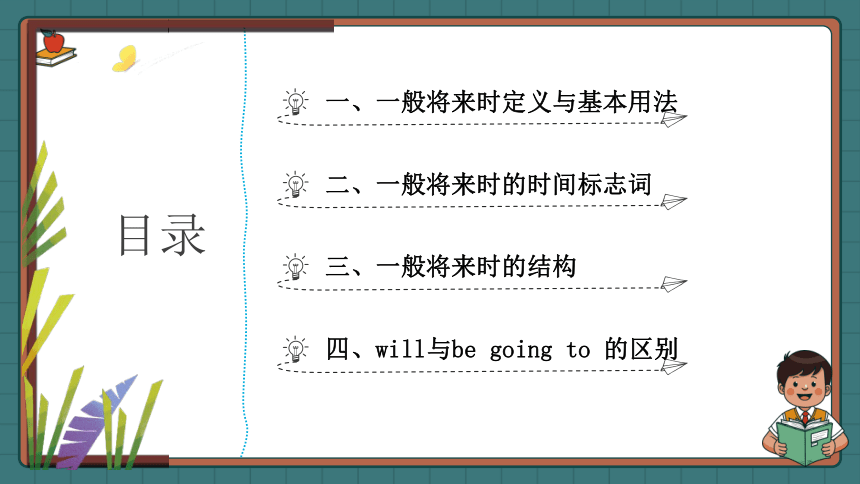
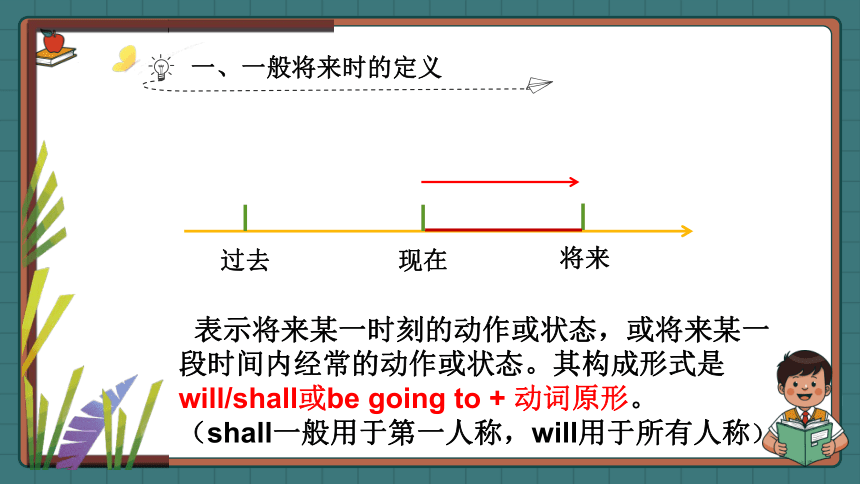
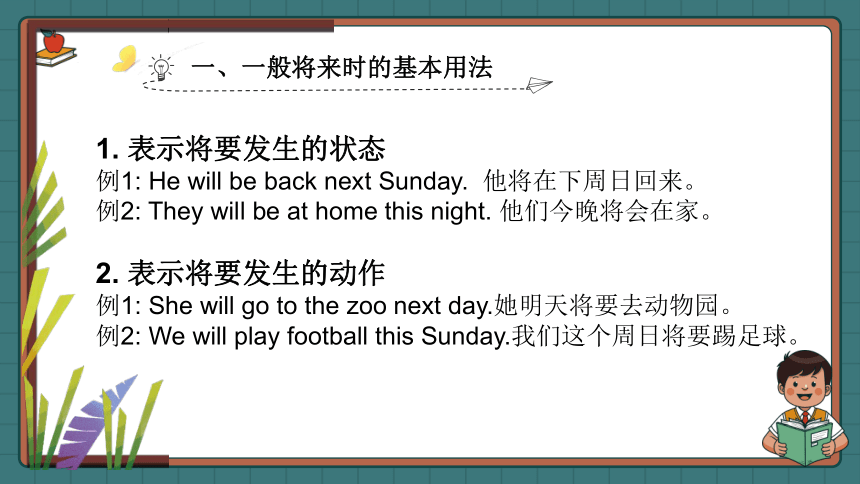
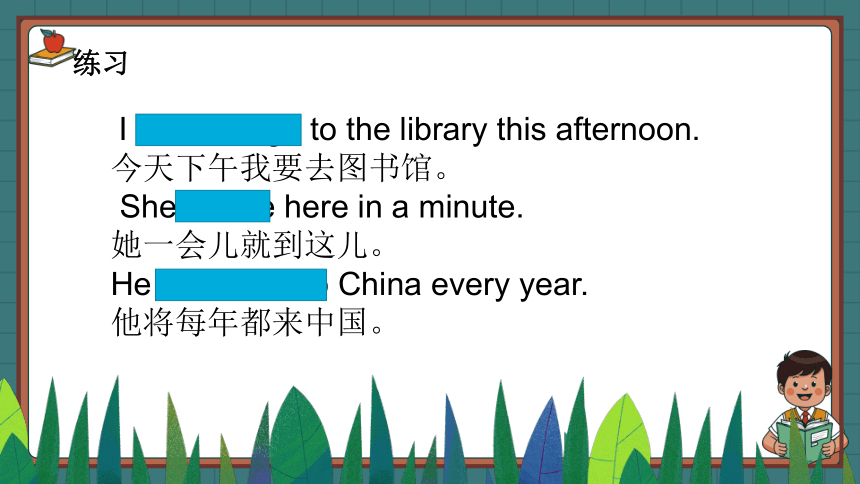
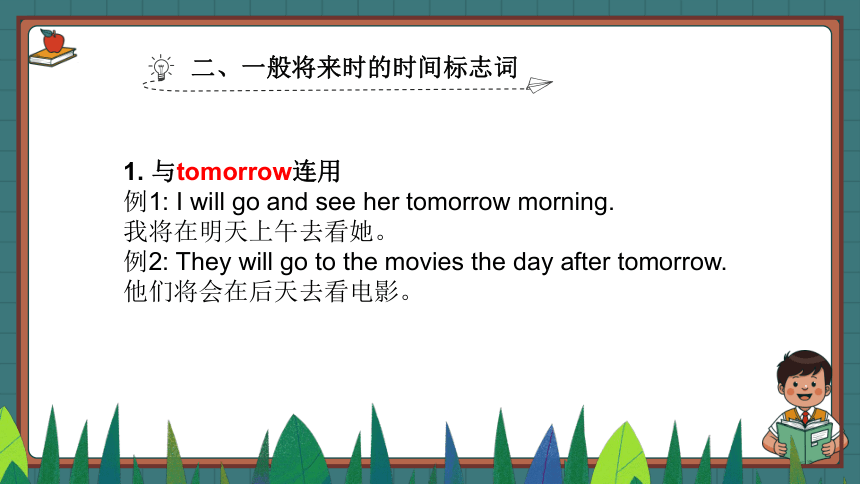
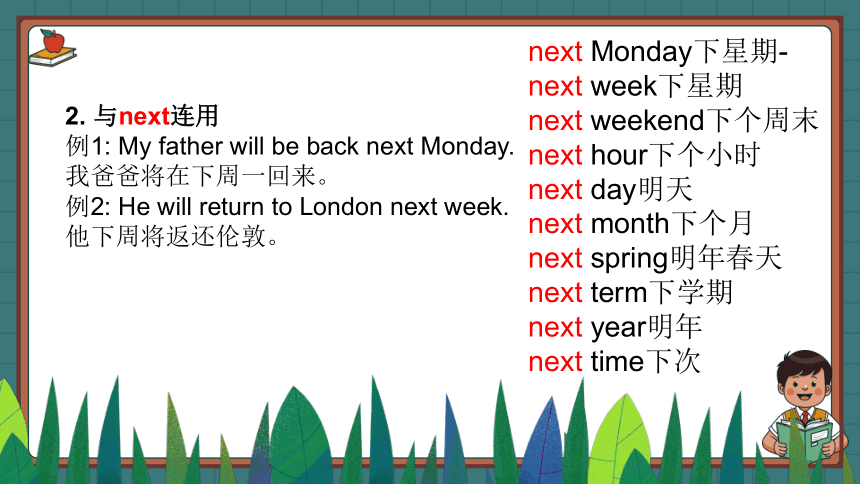
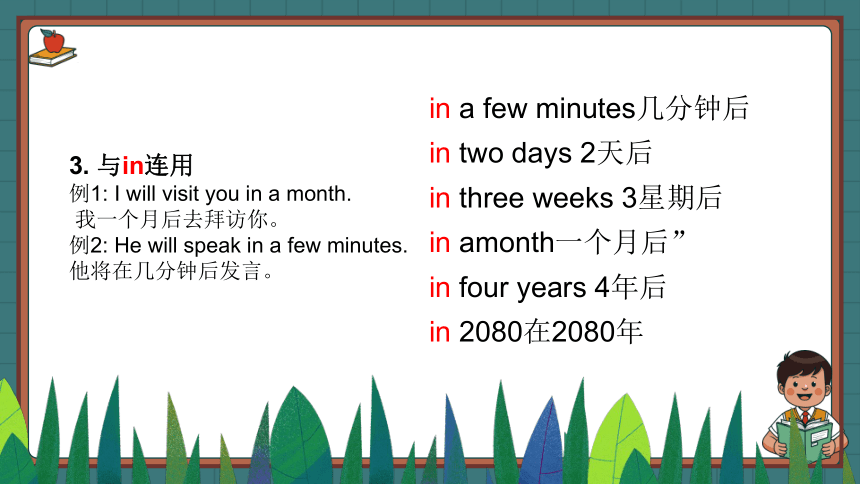
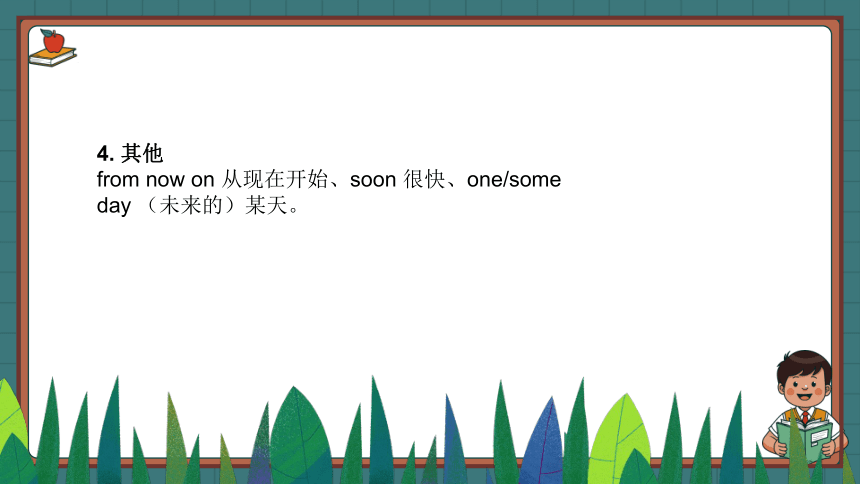
文档简介
(共28张PPT)
小升初复习
一般将来时
一、一般将来时定义与基本用法
二、一般将来时的时间标志词
三、一般将来时的结构
四、will与be going to 的区别
目录
一、一般将来时的定义
表示将来某一时刻的动作或状态,或将来某一段时间内经常的动作或状态。其构成形式是 will/shall或be going to + 动词原形。
(shall一般用于第一人称,will用于所有人称)
过去
现在
将来
一、一般将来时的基本用法
1. 表示将要发生的状态
例1: He will be back next Sunday. 他将在下周日回来。
例2: They will be at home this night. 他们今晚将会在家。
2. 表示将要发生的动作
例1: She will go to the zoo next day.她明天将要去动物园。
例2: We will play football this Sunday.我们这个周日将要踢足球。
I shall/will go to the library this afternoon.
今天下午我要去图书馆。
She will be here in a minute.
她一会儿就到这儿。
He will come to China every year.
他将每年都来中国。
练习
二、一般将来时的时间标志词
1. 与tomorrow连用
例1: I will go and see her tomorrow morning.
我将在明天上午去看她。
例2: They will go to the movies the day after tomorrow.
他们将会在后天去看电影。
2. 与next连用
例1: My father will be back next Monday.
我爸爸将在下周一回来。
例2: He will return to London next week.
他下周将返还伦敦。
next Monday下星期-
next week下星期
next weekend下个周末
next hour下个小时
next day明天
next month下个月
next spring明年春天
next term下学期
next year明年
next time下次
3. 与in连用
例1: I will visit you in a month.
我一个月后去拜访你。
例2: He will speak in a few minutes.
他将在几分钟后发言。
in a few minutes几分钟后
in two days 2天后
in three weeks 3星期后
in amonth一个月后”
in four years 4年后
in 2080在2080年
4. 其他
from now on 从现在开始、soon 很快、one/some day (未来的)某天。
一、一般将来时的句子结构
1. 一般将来时will的句式结构
2. 一般将来时be going to的句式结构
will肯定结构
They will know the result soon. 他们很快就知道结果了。
I will go to the park tomorrow. 我明天将会去公园。
主语+will+动词原形+其他
will否定结构
They won't know the result soon. 他们不会很快知道结果。
I won't go to the park tomorrow. 我明天将不会去公园。
主语+will+not(=won't)+动词原形+其他
will一般疑问句结构
Will they know the result soon 他们很快就会知道结果吗?
Will you go to the park tomorrow. 你明天将会去公园吗?
Will+主语+动词原形+其他?
肯定回答:Yes, 主语+will.
否定回答:No, 主语+won't.
will特殊疑问句结构
When will they know the result 他们将会什么时候知道结果?
Who will know the result soon 谁将会很快知道结果?
1. 特殊疑问词+will+主语+动词原形+其他?
2. Who+will+动词原形+其他?
(Who引导,后面用陈述句语序)
be going to肯定结构
I am going to buy some mutton this afternoon.
我打算今天下午去买一些羊肉。
He is going to buy some mutton this afternoon.
他打算今天下午去买一些羊肉。
They are going to buy some mutton this afternoon.
他们打算今天下午去买一些羊肉。
主语+be going to+动词原形+其他
be going to否定结构
I am not going to buy some mutton this afternoon.
我不打算今天下午去买一些羊肉。
He isn't going to buy some mutton this afternoon.
他不打算今天下午去买一些羊肉。
They aren't going to buy some mutton this afternoon.
他们不打算今天下午去买一些羊肉。
主语+be not going to+动词原形+其他
be going to一般疑问句结构
Are you going to buy some mutton this afternoon
你打算今天下午去买一些羊肉吗?
Is he going to buy some mutton this afternoon
他打算今天下午去买一些羊肉吗?
Are they going to buy some mutton this afternoon
他们打算今天下午去买一些羊肉吗?
Be+主语+ going to+动词原形+其他?(其中,肯定句中的I,we要变成you)
肯定回答:Yes, 主语+be.
否定回答:No, 主语+be not.
be going to特殊疑问句结构
When are you going to buy some mutton
你打算什么时候去买一些羊肉?
When is he going to buy some mutton
他打算什么时候去买一些羊肉?
Who is going to buy some mutton this afternoon
谁打算今天下午去买一些羊肉?
1. 特殊疑问词+be+主语+going to+动词原形+其他?
2. Who is going to+动词原形+其他?
Bonus Time
将下列句子改成一般疑问句
I am going to play basketball the day after tomorrow.
Are you going to play basketball the day after tomorrow
There will be a concert(音乐会) in two days.
Will there be a concert in two days
对划线部分提问
I am going to play basketball the day after tomorrow.
When are you going to play basketball
They will go to a concert next weekends.
What will they do/go next weekends
四、will与be going to区别
区别1:
表示近期、眼下就要发生的事情,要用be going to 。标志词:soon,at once等。
表示将来较远一些时间要发生的事情,要用will。
区别2:
表示根据主观判断将来绝对发生的事情,要用be going to。
标志词:think
表示客观上将来势必发生的事情,要用will。
客观事实等
区别4:
当时临时想到的意图或临时作出的决定时,要用will。
表示经过事先考虑好的意图时,要用be going to。
标志词:for a long time等。
区别3:
be going to表示“计划、打算,准备”做某事。
标志词:plan等。
will表示“未经过打算、准备”做某事。
选词填空(will/ be going to)
1.We _______ a house in the Mars in 100 years.
2.I think I _______ do my homework at once.
3.He _____ be 13 years old next year.
4.Next year _____ be 2022.
5.John _________ give a speech next Monday morning, he has prepared for a long time.
6.I think that my mother __________ blame me for coming back home too late.
will
will
will
will
is going to
is going to
THANK YOU
https://www.21cnjy.com/help/help_extract.php
小升初复习
一般将来时
一、一般将来时定义与基本用法
二、一般将来时的时间标志词
三、一般将来时的结构
四、will与be going to 的区别
目录
一、一般将来时的定义
表示将来某一时刻的动作或状态,或将来某一段时间内经常的动作或状态。其构成形式是 will/shall或be going to + 动词原形。
(shall一般用于第一人称,will用于所有人称)
过去
现在
将来
一、一般将来时的基本用法
1. 表示将要发生的状态
例1: He will be back next Sunday. 他将在下周日回来。
例2: They will be at home this night. 他们今晚将会在家。
2. 表示将要发生的动作
例1: She will go to the zoo next day.她明天将要去动物园。
例2: We will play football this Sunday.我们这个周日将要踢足球。
I shall/will go to the library this afternoon.
今天下午我要去图书馆。
She will be here in a minute.
她一会儿就到这儿。
He will come to China every year.
他将每年都来中国。
练习
二、一般将来时的时间标志词
1. 与tomorrow连用
例1: I will go and see her tomorrow morning.
我将在明天上午去看她。
例2: They will go to the movies the day after tomorrow.
他们将会在后天去看电影。
2. 与next连用
例1: My father will be back next Monday.
我爸爸将在下周一回来。
例2: He will return to London next week.
他下周将返还伦敦。
next Monday下星期-
next week下星期
next weekend下个周末
next hour下个小时
next day明天
next month下个月
next spring明年春天
next term下学期
next year明年
next time下次
3. 与in连用
例1: I will visit you in a month.
我一个月后去拜访你。
例2: He will speak in a few minutes.
他将在几分钟后发言。
in a few minutes几分钟后
in two days 2天后
in three weeks 3星期后
in amonth一个月后”
in four years 4年后
in 2080在2080年
4. 其他
from now on 从现在开始、soon 很快、one/some day (未来的)某天。
一、一般将来时的句子结构
1. 一般将来时will的句式结构
2. 一般将来时be going to的句式结构
will肯定结构
They will know the result soon. 他们很快就知道结果了。
I will go to the park tomorrow. 我明天将会去公园。
主语+will+动词原形+其他
will否定结构
They won't know the result soon. 他们不会很快知道结果。
I won't go to the park tomorrow. 我明天将不会去公园。
主语+will+not(=won't)+动词原形+其他
will一般疑问句结构
Will they know the result soon 他们很快就会知道结果吗?
Will you go to the park tomorrow. 你明天将会去公园吗?
Will+主语+动词原形+其他?
肯定回答:Yes, 主语+will.
否定回答:No, 主语+won't.
will特殊疑问句结构
When will they know the result 他们将会什么时候知道结果?
Who will know the result soon 谁将会很快知道结果?
1. 特殊疑问词+will+主语+动词原形+其他?
2. Who+will+动词原形+其他?
(Who引导,后面用陈述句语序)
be going to肯定结构
I am going to buy some mutton this afternoon.
我打算今天下午去买一些羊肉。
He is going to buy some mutton this afternoon.
他打算今天下午去买一些羊肉。
They are going to buy some mutton this afternoon.
他们打算今天下午去买一些羊肉。
主语+be going to+动词原形+其他
be going to否定结构
I am not going to buy some mutton this afternoon.
我不打算今天下午去买一些羊肉。
He isn't going to buy some mutton this afternoon.
他不打算今天下午去买一些羊肉。
They aren't going to buy some mutton this afternoon.
他们不打算今天下午去买一些羊肉。
主语+be not going to+动词原形+其他
be going to一般疑问句结构
Are you going to buy some mutton this afternoon
你打算今天下午去买一些羊肉吗?
Is he going to buy some mutton this afternoon
他打算今天下午去买一些羊肉吗?
Are they going to buy some mutton this afternoon
他们打算今天下午去买一些羊肉吗?
Be+主语+ going to+动词原形+其他?(其中,肯定句中的I,we要变成you)
肯定回答:Yes, 主语+be.
否定回答:No, 主语+be not.
be going to特殊疑问句结构
When are you going to buy some mutton
你打算什么时候去买一些羊肉?
When is he going to buy some mutton
他打算什么时候去买一些羊肉?
Who is going to buy some mutton this afternoon
谁打算今天下午去买一些羊肉?
1. 特殊疑问词+be+主语+going to+动词原形+其他?
2. Who is going to+动词原形+其他?
Bonus Time
将下列句子改成一般疑问句
I am going to play basketball the day after tomorrow.
Are you going to play basketball the day after tomorrow
There will be a concert(音乐会) in two days.
Will there be a concert in two days
对划线部分提问
I am going to play basketball the day after tomorrow.
When are you going to play basketball
They will go to a concert next weekends.
What will they do/go next weekends
四、will与be going to区别
区别1:
表示近期、眼下就要发生的事情,要用be going to 。标志词:soon,at once等。
表示将来较远一些时间要发生的事情,要用will。
区别2:
表示根据主观判断将来绝对发生的事情,要用be going to。
标志词:think
表示客观上将来势必发生的事情,要用will。
客观事实等
区别4:
当时临时想到的意图或临时作出的决定时,要用will。
表示经过事先考虑好的意图时,要用be going to。
标志词:for a long time等。
区别3:
be going to表示“计划、打算,准备”做某事。
标志词:plan等。
will表示“未经过打算、准备”做某事。
选词填空(will/ be going to)
1.We _______ a house in the Mars in 100 years.
2.I think I _______ do my homework at once.
3.He _____ be 13 years old next year.
4.Next year _____ be 2022.
5.John _________ give a speech next Monday morning, he has prepared for a long time.
6.I think that my mother __________ blame me for coming back home too late.
will
will
will
will
is going to
is going to
THANK YOU
https://www.21cnjy.com/help/help_extract.php
